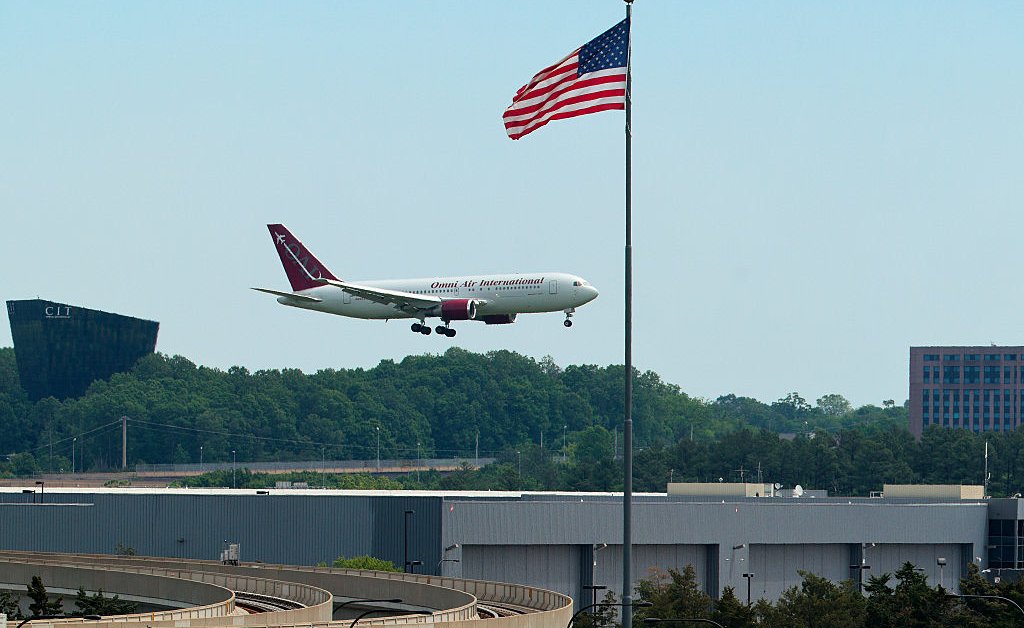The first group of refugees brought into the U.S. since Donald Trump became President followed an unusual path. On his first day back in office, he suspended all refugee admissions to the U.S.—upending resettlement plans for thousands fearing persecution and violence. Eighteen days later, he announced an exception for white South Africans who “are victims of unjust racial discrimination.”
On Monday, the U.S. welcomed a chartered plane carrying about 50 Afrikaners, marking a new phase of the U.S. refugee program that looks nothing like what came before it. Trump’s order specifically referred to Afrikaners, descendants of mainly Dutch colonial settlers who arrived in South Africa in the 1600s and controlled the country from 1948 to 1994 through the racial separation laws known as apartheid.
Shortly after their plane landed at Dulles International Airport in Virginia outside of Washington, D.C., the South Africans stood in front of news cameras holding American flags as they were greeted by Trump administration officials. “You are really welcome here and we respect what you have had to deal with these last few years,” said Christopher Landau, deputy Secretary of State. Landau called the Afrikaners “quality seeds” who will “bloom” in the U.S. “As you know—a lot of you I think are farmers, right—when you have quality seeds, you can put them in foreign soil and they will blossom. They will bloom,” Landau told the families. “We are excited to welcome you here to our country where we think you will bloom.”
Trump’s carve out for Afrikaners was partly spurred in reaction to a 2024 South African law that seeks to address the concentration of agricultural land in the hands of white South Africans.
“Farmers are being killed,” Trump said Monday, when asked by a TIME reporter why Afrikaners were being accepted over refugees in other parts of Africa and the world. “They happen to be white but whether they’re white or black makes no difference to me. But white farmers are being brutally killed and their land is being confiscated in South Africa.”
South African officials insist Trump’s allegations of persecuted white South African farmers are unfounded. “The South Africa Police Services statistics on farm-related crimes do not support allegations of violent crime targeted at farmers generally or any particular race,” the country’s Ministry of International Relations and Cooperation said in a recent statement. “There are sufficient structures available within South Africa to address concerns of discrimination. Moreover, even if there are allegations of discrimination, it is our view that these do not meet the threshold of persecution required under domestic and international refugee law.”
Stephen Miller, a White House deputy chief of staff, told reporters on Friday the first flight from South Africa is part of a “much larger-scale relocation effort” and said what Afrikaners face in South Africa “fits the textbook definition of why the refugee program was created.” Another key Trump ally, Elon Musk, was born in South Africa and has pressed for the U.S. to do more to protect white South Africans from what he described on his X platform as “white genocide”.
Refugees coming into the U.S. are typically vetted by the United Nations High Commissioner for Refugees, which routinely refers people fleeing persecution and violence in their home countries to safer countries like the U.S. The arrivals from South Africa were not vetted by that office.
On Monday, The Episcopal Church refused a Trump administration demand that it help resettle the Afrikaners in the U.S. The protestant church has worked with the federal government for four decades through Episcopal Migration Ministries to help newly arrived refugees find jobs and places to live in the U.S. “It has been painful to watch one group of refugees, selected in a highly unusual manner, receive preferential treatment over many others who have been waiting in refugee camps or dangerous conditions for years,” wrote the presiding bishop of the Episcopal Church, Rev. Sean W. Rowe, in a letter explaining the protestant church’s decision to completely stop working with the federal government on refugee resettlement. Rowe wrote that the U.S. Refugee Admissions Program has been “essentially shut down” since January, and he was “saddened and ashamed” that many refugees denied entrance to the U.S. had served alongside the U.S. military in Iraq and Afghanistan and now face danger at home because of their service. “Jesus tells us to care for the poor and vulnerable as we would care for him, and we must follow that command,” Rowe wrote.
The Trump administration is on track for a dramatic decline in new refugees this year. The Biden Administration admitted 100,034 people through its refugee program into the 2024 fiscal year, which ended in September. That was up from 60,014 in 2023, and 25,465 in 2022. During the 2024 fiscal year, the largest group of refugees—34,017—came from Africa, followed by 7,540 from Asia, 3,180 from Europe and Central Asia, 5,106 from Latin America and the Caribbean, and 10,003 from the Near East and South Asia, according to figures from the U.S. Refugee Admissions Program.
Bill Frelick, director of the refugee and migrants rights division of Human Rights Watch, says the Trump administration’s decision to limit refugee admissions to a few dozen white South Africans undermines decades of efforts by the U.S. to welcome people in need. “It sends a message that unless you’re a member of a privileged group that the U.S. has a preference for, the door is closed to you entirely,” Frelick says.
Frelick notes that the U.N. has a system to determine which refugees “are most at risk and in need for resettlement.” By ignoring that, he says, the Trump Administration is “setting a terrible example to other countries around the world.”
Read the full article here


